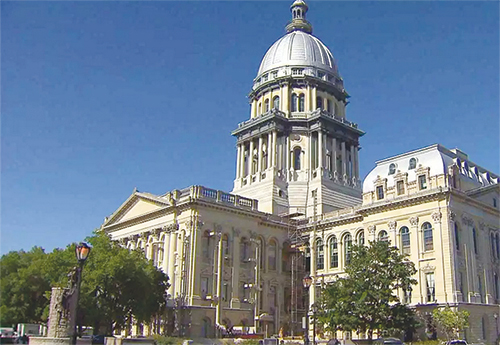By CARL GREEN
Illinois Correspondent

Springfield, IL – The highlights of the Illinois Legislature’s historic spring 2019 session have been well-reported and documented, but less attention has been paid to a volley of Labor and worker-supporting bills that passed both the House and Senate and are on the way to becoming law.
The volley of new worker-friendly legislation is worthy of a quick recap:
• A minimum wage increase, phasing in to reach $15 by 2025.
• A law against local “right-to-work” schemes, putting former Gov. Bruce Rauner’s pet project into a well-deserved limbo.
• A progressive income tax referendum, giving voters a chance to end the old, unfair flat tax next year.
• A balanced budget with more money for human services and education, saving some state universities from possible failure, while continuing to work down the state’s debts.
• A capital spending bill, the first in 10 years, which will put Illinoisans to work on roads, bridges, buildings and other needed infrastructure.
• Expanding gaming and legalizing cannabis, both of which are expected to create jobs, including union jobs.
AN HISTORIC SESSION
It would have been an historic session, even if those were the only bills that passed, but there were also many smaller bills passed to help working people and their families.
In the Democratically controlled House and Senate, most passed along party lines, though some passed with bipartisan or unanimous support.
Democratic legislators from the Metro-East and southern Illinois were prominent in introducing and supporting these bills, with Rep. Jay Hoffman (D-Swansea) taking the lead on many.
Here are some of the hundreds of bills that were filed and passed. Many others remain under consideration.
WORKERS AND BOSSES
- Wage history snooping – Employers will not be allowed to screen applicants’ wage histories or require minimum or maximum wages in previous jobs.
- Prompt payment – To reduce delays in payments to workers, retainers withheld from construction contracts will be limited to no more than 10 percent before half-completion and five percent after that.
- Hazardous workplaces – This Hoffman legislation raises penalties for non-compliance with rules against extra-hazardous workplaces under the Workers’ Compensation Act. It also streamlines the process by allowing a single commissioner to approve enforcement actions and issue emergency work-stop orders.
- Asbestos exposure – This measure, signed into law by Pritzker in May, lifts the statute of limitations for workers seeking compensation for asbestos exposure.
- Workers’ protection – Another Hoffman bill, this measure will create a Workers Protection Unit in the Attorney General’s office to handle criminal and civil cases, and establish a related task force of state’s attorneys to address underpayment of wages, unsafe work conditions, unfair employment practices and shirking tax and labor responsibilities.
- Hazardous paper – This bill prohibits use of the dangerous chemical Bisphenol A in paper for banking and business records. The state EPA is charged with seeking out alternatives.
SCHOOLS & TEACHERS
- Workplace rights – High schools will have to teach a unit on workplace rights, including legal protections against sexual harassment and racial discrimination. This bill passed unanimously.
- Graduate research assistants – The underpaid, unsung heroes of the universities can now be recognized as employees and thus become eligible for employee rights and benefits, including collective bargaining.
- Charter schools – The state will abolish the Charter School Commission on July 1, 2020, and transfer its powers to the State Board of Education and local school districts. Current charter schools will have to apply to local districts to continue when their current charters end. The State Board can overturn the districts’ decisions upon appeal. Teachers’ unions were strongly for this bill, in part, because the charters pull money away from public schools.
- Teacher retirement – This was a top priority for teahers unions. Under Rauner, school districts were forced to assume the state pension share on final-year raises over three percent – called the liability cap. The old limit was six percent. The change set off repercussions including blocking pay for sponsoring groups and coaching, holding down pay in teachers’ contracts, limiting promotions and making it harder for districts to hire qualified teachers. Sen. Andy Manar (D-Bunker Hill) sponsored this bill that restores the old six percent limit.
- Minimum teacher salaries – With a minimum state salary of $10,000 for Illinois teachers unchanged for decades, many have had to work for poverty wages or seek other employment. Legislation sponsored by Manar and Katie Stuart (D-Edwardsville) and approved by the Legislature, calls for increasing salaries to $40,000 over the next five years, increasing the minimum salary to a $32,076 in the 2020-21 school year, $34,576 in 2021-22 and $37,076 in 2022-23.
- Vocational education – The Illinois Student Assistance Commission will provide scholarships of up to $2,000 a year for unemployed adults 30 and over for vocational education at community colleges beginning next year. Recipients can qualify for additional years if they show they are making progress.
- Higher education savings – This legislation establishes the Illinois Higher Education Savings Program through the Treasurer’s office with $8 million in seed funding and the authority to accept contributions, appropriations, interest and gifts. The program will to create savings partnerships with families and promote financial literacy.
- School support workers – A bill filed by Stuart allows recall rights for up to a year for school support workers who get laid off because of program changes. Teachers already have that right.
PUBLIC SAFETY
- Union representation – Another Hoffman measure requires the Illinois Fire Advisory Commission to include at least one representative of the Labor apprenticeship program for installation and repair of fire extinguishing system.
- Labor history – The history of the Labor Movement in the fire service will be added to the training curriculum for fire fighters.
- Rail crew safety – After years of trying, railroad worker unions won passage of this requirement to have at least two crew members present on all carriers passing through Illinois.
- Responder compensation – Fire fighters, EMTs, and paramedics who contract the Staphylococcus infection on the job will now qualify for workers’ compensation coverage. Passage was unanimous.
OTHER BILLS
- Miners exam board – The Miners Examining Board, which administers exams to applicants for certification as miners, will now have to include at least two representatives of miners unions. The requirement that they have worked in a mine for the past year is removed.
- Machinist license decals – A bill sponsored by Sen. Christopher Belt (D-Cahokia) allows Machinists Lodge 701 of the Chicago area to issue license plate decals to raise training funds and funds for Machinists guide dogs charity.
- Buy American – A House resolution urges support for American steelworkers and purchasing of U.S.-made steel. A Senate resolution urges the state to establish Buy American and Buy Illinois policies.


